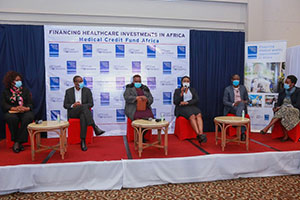Medical Credit Fund (MCF), a non-profit fund primarily committed to funding small and medium Enterprises (SMEs) healthcare enterprises in Africa, has received a catalytic investment of Sh900 million from the Dutch Ministry of Foreign Affairs.
The Fund, according to Maarten Brouwer, the Netherlands Ambassador to Kenya, is focused at establishing new digital finance solutions to promote investments in African health infrastructure and improve access to high-quality basic healthcare.
Because health and development are inextricably linked, achieving universal health coverage will ensure that everyone, regardless of social position, has access to high-quality healthcare,” stated Amb. Brouwer.
Amb. Brouwer announced that the funds will save small and medium-sized healthcare companies that have poor infrastructure, limited means to invest in quality improvement, and difficulty accessing capital from commercial banks during the celebrations of the first loan disbursement within Medical Credit Fund 2.
Arjan Poels, Managing Director of Medical Credit Fund, noted that the infrastructure and equipment utilised in SMEs hospitals have an impact on the quality of treatment they provide to patients who visit their facilities.
“The Covid-19 pandemic has highlighted the value of well-functioning health systems. MCF2 aims to promote equitable and high-quality healthcare by assisting clinics in improving the services they provide, according to Poels.
Poels went on to say that the MCF was founded on Kenya’s advanced mobile money ecosystem, which led the launch of its cash advance, a credit product aimed at improving access to capital for the health sector.
In his remarks, PharmAccess Foundation Country Director Kenya, Isaiah Okoth, noted that achieving Universal Health Coverage necessitates striking a balance between allowing residents to receive care without financial hardship and the availability of high-quality healthcare facilities.
MCF, according to Okoth, is using the potential of the mobile phone to increase access to quality healthcare in Africa by using digital loans. “During the epidemic, digital lending has proven critical, with Covid-19 increasing mobile money use and further lowering banks’ desire for SME credit,” Okoth added.
Most health institutions were on the verge of closure because they couldn’t get bank loans to bridge cash flow gaps or buy personal protective equipment (PPEs), according to the Foundation’s Country Director, who said that Cash Advance proved to be the solution due to its convenience and flexibility.
MCF was able to release Sh2.4 billion in 2020, and has been averaging Sh433 million per month in disbursements since the start of 2021, according to him.
Millicent Olulo Orera, MCF Regional Director Advocacy and Partnerships, stated, “We believe that better functioning healthcare markets are critical in attaining Sustainable Development Goals, particularly those connected to Universal Health Coverage.”
According to Olulo, the fund would begin operations in its present nations of operation, which include Kenya, Ghana, Nigeria, Tanzania, and Uganda, before expanding to additional countries.
Sori Lakeside Hospital in Homabay County was the first recipient of MCF 2, receiving Sh4.25 million from the Medical Credit Fund.

